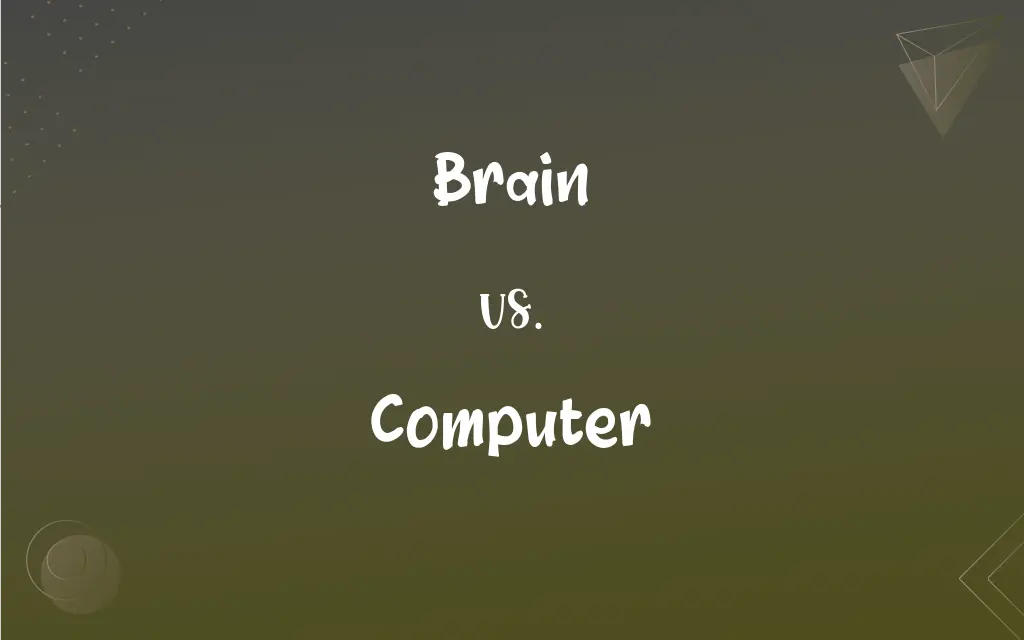Brain vs. Computer: What's the Difference?
Edited by Aimie Carlson || By Janet White || Published on February 22, 2024
The brain is a biological organ responsible for thought, memory, and emotion, using neural networks, while a computer is an electronic device executing programmed instructions using binary code.

Key Differences
The brain, a complex biological organ, functions as the control center of the human body, facilitating thought, emotion, and memory through intricate neural networks. Conversely, a computer is an electronic device designed to process, store, and retrieve data, operating primarily through binary code - sequences of zeros and ones.
The brain's capability for creativity, intuition, and learning through experience is unparalleled. It can comprehend context, abstract concepts, and emotional nuances. In contrast, a computer, though exceptionally fast at processing and calculating, lacks the ability to understand context or exhibit creativity inherently. Its functions are confined to the logic and instructions programmed into it.
In terms of adaptability and learning, the human brain is remarkably flexible, able to learn from new experiences and adapt to changing environments. Computers, however, require specific programming to perform tasks and are not inherently adaptive, although advances in artificial intelligence are narrowing this gap.
The brain communicates internally through a vast network of neurons, using electrical and chemical signals. This network enables complex thought processes and decision-making. On the other hand, a computer communicates through electrical signals in circuits and requires pre-defined algorithms and programs to make decisions.
The human brain is energy-efficient, requiring a relatively small amount of energy (about 20 watts) for its complex functions. In contrast, computers, especially powerful ones, can consume a significant amount of electricity, though they are becoming more energy-efficient with technological advancements.
ADVERTISEMENT
Comparison Chart
Function
Facilitates thought, memory, emotion.
Processes, stores, retrieves data.
Operation
Uses neural networks, chemical and electrical signals.
Operates via binary code and electrical circuits.
Adaptability
Learns and adapts from experience.
Requires programming for tasks.
Creativity
Capable of creativity and intuition.
Lacks inherent creativity, follows programmed logic.
Energy Efficiency
Highly energy-efficient.
Varies, generally less energy-efficient.
ADVERTISEMENT
Brain and Computer Definitions
Brain
The brain is the central organ of the human nervous system, responsible for processing information.
The human brain can process complex emotions and thoughts.
Computer
Computers operate through binary code and programmable software.
The computer runs software designed to edit videos.
Brain
It's involved in regulating bodily functions and enabling consciousness.
The brain controls everything from breathing to intricate decision-making.
Computer
It stores and retrieves data efficiently for various applications.
She used her computer to store all her research data.
Brain
The brain has remarkable capabilities for learning and memory.
Her brain's ability to recall detailed memories is astounding.
Computer
A computer is an electronic device that processes data according to instructions.
The computer can calculate complex equations swiftly.
Brain
It operates through an interconnected network of neurons.
The brain's neural network is crucial for problem-solving.
Computer
They are used widely in automation, computation, and communication.
Businesses rely on computers for managing their operations.
Brain
The brain is essential for emotional understanding and empathy.
His brain's capacity for empathy affects his interactions with others.
Computer
Modern computers are capable of artificial intelligence applications.
His computer uses AI to predict market trends.
Brain
The portion of the vertebrate central nervous system that is enclosed within the cranium, continuous with the spinal cord, and composed of gray matter and white matter. It is the primary center for the regulation and control of bodily activities, receiving and interpreting sensory impulses, and transmitting information to the muscles and body organs. It is also the seat of consciousness, thought, memory, and emotion.
Computer
A device that computes, especially a programmable electronic machine that performs high-speed mathematical or logical operations or that assembles, stores, correlates, or otherwise processes information.
Brain
A functionally similar portion of the invertebrate nervous system.
Computer
Such a device along with peripherals, especially a monitor, keyboard, and mouse.
FAQs
What kind of signals does the brain use?
It uses electrical and chemical signals.
What is a computer mainly used for?
It's used for processing, storing, and retrieving data.
What is the primary function of the brain?
It processes information, controls bodily functions, and enables consciousness.
How do computers operate?
They operate using binary code and electronic circuits.
How energy-efficient is the brain?
The brain is highly energy-efficient, using about 20 watts.
What is the storage capacity of a computer?
It varies, but it's quantifiable and can be extremely large.
How does the brain handle multitasking?
The brain can multitask but may become less efficient.
How does the brain learn?
The brain learns from experience and adapts to new information.
Can computers be creative?
Computers follow programmed logic and lack inherent creativity.
Can computers learn like brains?
Computers require programming, but AI allows them to learn in a limited way.
Is the brain involved in emotional processing?
Yes, the brain is crucial for emotional understanding and empathy.
Can computers understand emotions?
Computers can recognize patterns in emotional data but don't truly understand emotions.
Are brains capable of creativity?
Yes, brains are inherently capable of creativity and intuition.
Are computers energy-efficient?
It varies, but generally, they are less energy-efficient than brains.
Do brains have a storage capacity?
Yes, but it's not quantifiable like computer storage.
How effective are computers at multitasking?
Computers are highly effective at multitasking, depending on their specifications.
Can the brain process information like a computer?
It processes differently, often focusing on context and abstract concepts.
How fast can a computer process information?
Computers can process information extremely quickly, depending on their hardware.
How does the brain's memory compare to computer memory?
Brain memory is associative and non-linear, unlike the linear, structured memory of computers.
What is the role of AI in bridging the gap between brains and computers?
AI attempts to mimic certain aspects of brain function but still operates within the bounds of computer logic.
About Author
Written by
Janet WhiteJanet White has been an esteemed writer and blogger for Difference Wiki. Holding a Master's degree in Science and Medical Journalism from the prestigious Boston University, she has consistently demonstrated her expertise and passion for her field. When she's not immersed in her work, Janet relishes her time exercising, delving into a good book, and cherishing moments with friends and family.
Edited by
Aimie CarlsonAimie Carlson, holding a master's degree in English literature, is a fervent English language enthusiast. She lends her writing talents to Difference Wiki, a prominent website that specializes in comparisons, offering readers insightful analyses that both captivate and inform.
































































